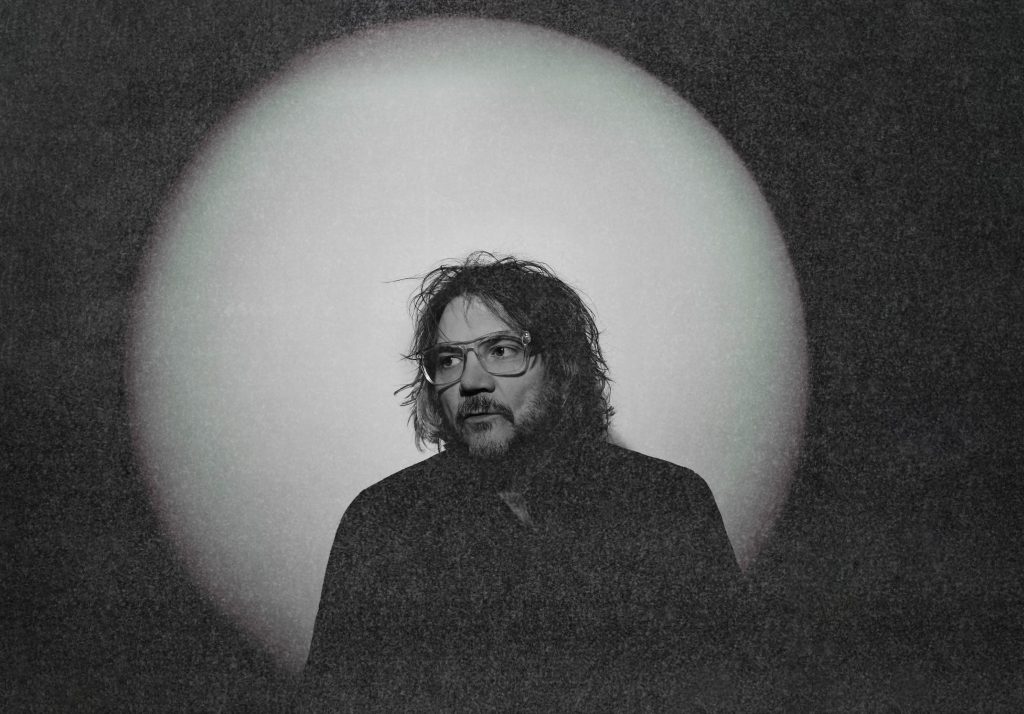How Jeff Tweedy Made a New Magnum Opus

“Twilight Override,” the latest solo project by the Wilco leader, is a triple album that earns every minute.
By Jon Pareles
The way Jeff Tweedy tells it, “Twilight Override” — his new triple album, with 30 songs on three discs — got its start on a road trip.
Tweedy, who leads the long-running band Wilco, was planning a four-hour drive with his two sons, Spencer and Sammy. He decided it was a good occasion to listen all the way through “Sandinista!,” the 1980 triple album by the Clash: a sprawl of brash, style-hopping songs and studio experiments. Soon, the idea of making his own triple album took hold. In a video interview, he jokingly dubbed the new album “Sad-inista.”
A triple album is “counterintuitive,” he said. “By giving somebody a lot of music to luxuriate in, you’re setting up a little barrier. But it’s also for a certain type of listener to be rewarded. And I just thought that it flies in the face of a culture that’s gotten faster, more surface level.”
The album’s working title, Tweedy said, was initially “Triple Rainbow.” Then it was “Tons of Time.”
“I don’t think there’s anything wrong with aspiring to explore a different length, and to see if I can hold somebody’s attention for two hours, and hold my own attention, and allow songs to be around a bunch of other songs that wouldn’t necessarily make the cut if you’re going for maximum impact,” he explained.
“The idea of being able to facilitate someone spending two hours doing something like listening to a record intentionally — I don’t know if very many people are actually going to do that. But I think it’s designed to do that. And that’s what I wanted to do.”
Plaid-shirted and bespectacled, Tweedy, 58, was speaking from the kitchen of the Loft, Wilco’s longtime studio and headquarters in Chicago. (The Loft’s many guitars, keyboards and devices, along with the members of Tweedy’s own touring band, appear in the video for one of the new songs, “Feel Free.”) Behind him sat a keepsake from another singular Midwestern band: a doll of Devo’s mascot Booji Boy, wearing a red plastic “energy dome” hat. On the wall was the painting of a longhaired white cat that appeared on the cover of Wilco’s 2015 album, “Star Wars.”
Tweedy has been a startlingly prolific songwriter ever since the late 1980s, when he and Jay Farrar formed the Illinois band Uncle Tupelo. After Uncle Tupelo split up in 1994, Tweedy began leading Wilco, with a shifting lineup that stabilized in 2005.
Through the years, Wilco’s music has kept changing. Its songs — and any night’s concert set — can encompass country, punk, folk, psychedelia, electronics and noise, while the lyrics can be cryptic or unabashedly heartfelt. In his 2018 memoir, “Let’s Go (So We Can Get Back),” Tweedy wrote that “gutting myself in front of strangers, letting all the raw emotions come flooding out, making a fool of myself with my own words, was exactly what I always wanted to do with my life.”
By now, Wilco has become the rare epitome of an indie-rock cottage industry: self-guided, self-supporting, principled and still determined to explore. Wilco regularly tours theaters, sheds and festivals, and it owns both its studio and its label, dBpm (as in decibels per minute).
Since 2010, the band has headlined and curated a biennial, weekend-long festival, Solid Sound, that brings Wilco and kindred musical spirits to the Massachusetts Museum of Contemporary Art in North Adams, Mass. The band lost money on the festival’s early editions but persevered simply because it was “worth doing,” Tweedy said. “Hopefully, you’re doing something interesting enough for people to stick around.”
Sustainability, Tweedy said, “has been the lifelong project.”
“Everything has been scaled around that for a very long time,” he said. “It’s like, ‘Well, can we afford to do this? Oh, great. Then we can. We can’t? OK, well, then let’s not do that.’”
Tweedy has disciplined himself to be a consistently productive songwriter and musician. He devoted a second book, “How to Write One Song” (2020), to encouraging across-the-board creativity and to offering practical suggestions to aspiring songwriters. One is simply to devote at least 20 minutes every day to working on songs, good or bad.
“If you tried to write a bad song every day, you’d end up writing a good song every once in a while, you know?” he said. “I just think it’s about putting yourself in the position of being in the way of a song.”
When Wilco isn’t touring or recording, Tweedy makes solo albums — “Twilight Override” is his fifth — and tours with a band that includes Spencer Tweedy, 29, on drums and Sammy Tweedy, 25, on vocals and synthesizers.
“Any time my dad is off the road, he’s recording at the Loft and he’s building a song,” Spencer Tweedy said in a telephone interview. “I look at him and how he’s arranged things to be able to do that, and I try to keep it in mind and follow that example. There are lots of different ways that an artistic life looks, but it seems to me like everyone is capable of cutting out some things to be able to prioritize making their stuff — and reveling in that.”
The three sections of “Twilight Override” are “loosely based around the concepts of past, present and future,” Tweedy said. “But the concepts aren’t airtight. They leak into each other. And I like that.”
“Twilight Override” earns its length. It’s not padded with alternate versions or extended instrumentals; only three songs stretch past five minutes. The arrangements often feel cozy and handmade, largely built around Tweedy’s acoustic guitar and frequently topped by Macie Stewart’s violin; there are hints of Elliott Smith, Nick Drake, Simon & Garfunkel and Bob Dylan’s album “John Wesley Harding.”
Read full article here.